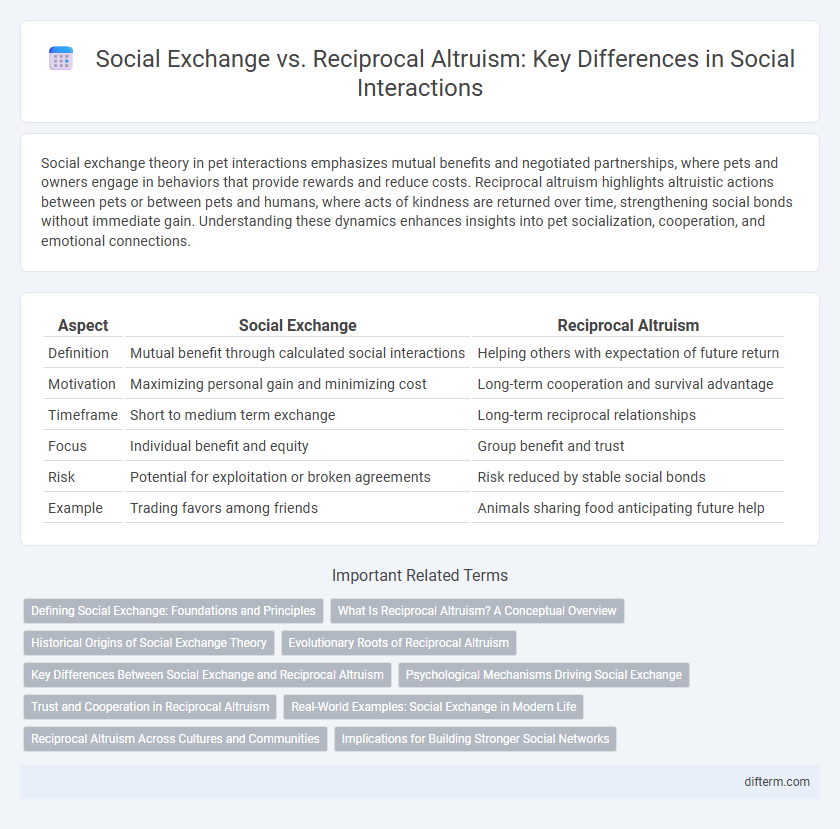Social exchange theory in pet interactions emphasizes mutual benefits and negotiated partnerships, where pets and owners engage in behaviors that provide rewards and reduce costs. Reciprocal altruism highlights altruistic actions between pets or between pets and humans, where acts of kindness are returned over time, strengthening social bonds without immediate gain. Understanding these dynamics enhances insights into pet socialization, cooperation, and emotional connections.
Table of Comparison
| Aspect | Social Exchange | Reciprocal Altruism |
|---|---|---|
| Definition | Mutual benefit through calculated social interactions | Helping others with expectation of future return |
| Motivation | Maximizing personal gain and minimizing cost | Long-term cooperation and survival advantage |
| Timeframe | Short to medium term exchange | Long-term reciprocal relationships |
| Focus | Individual benefit and equity | Group benefit and trust |
| Risk | Potential for exploitation or broken agreements | Risk reduced by stable social bonds |
| Example | Trading favors among friends | Animals sharing food anticipating future help |
Defining Social Exchange: Foundations and Principles
Social exchange theory centers on the idea that human interactions are transactions aimed at maximizing benefits and minimizing costs, grounded in principles of reciprocity and mutual dependence. It emphasizes conscious decision-making where individuals assess potential rewards and risks before engaging in social behavior. Unlike reciprocal altruism, which is driven by evolved genetic benefits, social exchange highlights rational calculations and negotiated exchanges within social relationships.
What Is Reciprocal Altruism? A Conceptual Overview
Reciprocal altruism refers to a behavior in which individuals offer benefits to others with the expectation of future reciprocation, enhancing mutual survival and social bonding. Unlike social exchange, which is based on immediate and tangible returns, reciprocal altruism operates on delayed paybacks and trust within social groups. This concept plays a crucial role in evolutionary biology and social psychology by explaining cooperation among non-kin and fostering long-term social relationships.
Historical Origins of Social Exchange Theory
Social Exchange Theory originated in the early 20th century with the works of sociologists like George Homans and Peter Blau, emphasizing the cost-benefit analysis in human interactions. This theory contrasts with Reciprocal Altruism, which is rooted in evolutionary biology and studies mutual aid based on genetic fitness and survival advantages. Historical foundations of Social Exchange Theory highlight social behavior as transactions aiming for maximum rewards and minimum costs within societal structures.
Evolutionary Roots of Reciprocal Altruism
Reciprocal altruism has evolutionary roots in the mutual benefits derived from repeated interactions among individuals, enhancing survival and reproductive success. Unlike social exchange, which emphasizes immediate cost-benefit calculations, reciprocal altruism relies on delayed returns and long-term cooperation between non-kin. This evolutionary strategy promotes trust and social bonds by ensuring individuals help others with the expectation of future reciprocation, reinforcing complex social structures.
Key Differences Between Social Exchange and Reciprocal Altruism
Social exchange emphasizes calculated, cost-benefit analyses where individuals seek to maximize personal gains through proportional returns, highlighting a transactional nature driven by self-interest. Reciprocal altruism involves helping behavior motivated by the expectation of future mutual benefits, often without immediate return, reflecting evolutionary strategies for long-term cooperation. Key differences include the immediacy of reciprocity in social exchange versus the delayed or indirect reciprocity in reciprocal altruism, and the underlying motivations where social exchange is strategic and reciprocal altruism is rooted in evolutionary adaptations for survival.
Psychological Mechanisms Driving Social Exchange
Psychological mechanisms driving social exchange involve cognitive processes such as cost-benefit analysis, expectation of reciprocity, and trust calibration, which motivate individuals to engage in mutually beneficial interactions. Unlike reciprocal altruism, where behavior is shaped by evolved predispositions for long-term genetic benefits, social exchange relies on conscious evaluations of rewards and punishments within social relationships. Empirical research highlights the role of empathy, social norms, and emotional responses in reinforcing cooperation and maintaining balanced exchanges in group dynamics.
Trust and Cooperation in Reciprocal Altruism
Reciprocal altruism relies heavily on trust to ensure mutual cooperation between individuals over time, fostering repeated interactions that benefit all parties involved. This form of social exchange differs from simple transactions by emphasizing long-term relationships where trustworthiness and the expectation of future returns encourage cooperative behavior. Trust acts as a critical mechanism in maintaining the balance of costs and benefits, making reciprocal altruism a foundation for complex social systems and collective well-being.
Real-World Examples: Social Exchange in Modern Life
Social exchange theory manifests in modern life through workplace collaborations where individuals engage in mutually beneficial interactions, such as sharing expertise for career advancement. Online communities exemplify social exchange by facilitating resource sharing, like advice or digital goods, fostering trust and ongoing participation. These real-world examples highlight how calculated costs and rewards drive social behavior beyond altruistic motives.
Reciprocal Altruism Across Cultures and Communities
Reciprocal altruism manifests uniquely across cultures and communities, shaped by social norms and kinship structures that influence cooperation and trust. Ethnographic studies reveal variations in reciprocal exchanges, from resource sharing in indigenous societies to time and favors in urban settings, highlighting adaptive social strategies. Understanding these cultural differences enhances insights into human social evolution and the mechanisms sustaining community resilience worldwide.
Implications for Building Stronger Social Networks
Social exchange theory emphasizes calculated benefits and costs in interactions, fostering trust and cooperation through mutually advantageous agreements. Reciprocal altruism involves unconditional acts of kindness with the expectation of future returns, strengthening emotional bonds and long-term commitment within social networks. Combining these models enhances network resilience by balancing rational exchanges with genuine empathy and reciprocity.
social exchange vs reciprocal altruism Infographic

 difterm.com
difterm.com